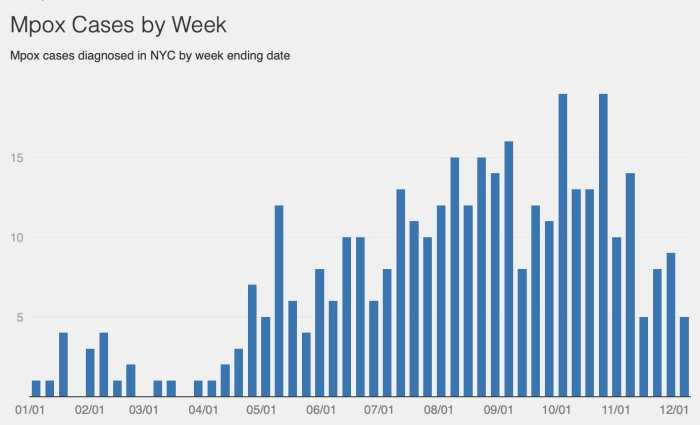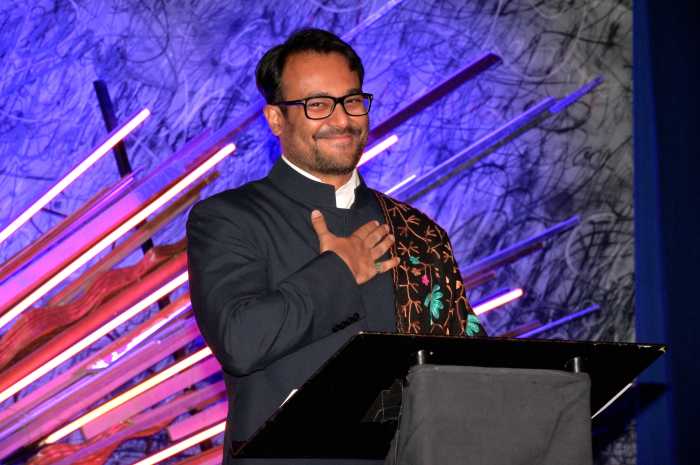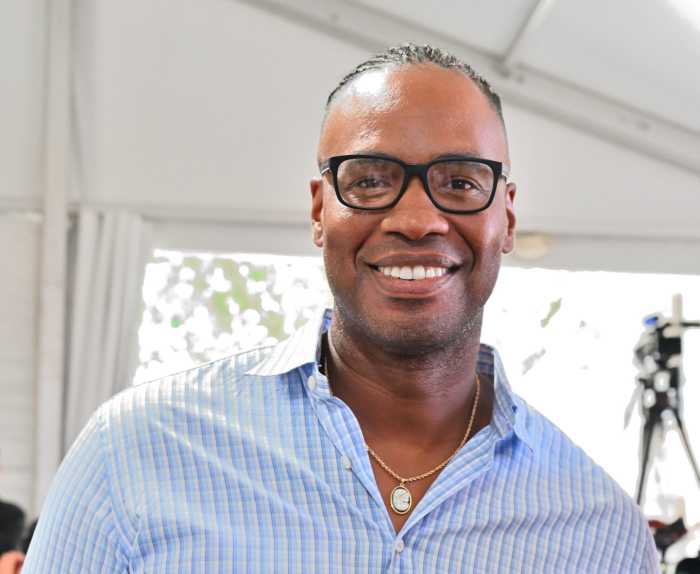Change in political tide favors Democrats, impacts on Cons. Amendment
Democratic Party strategists are increasingly encouraged by indications that their party’s candidates stand a chance of winning back the United States Senate this November, an eventuality that would have an enormous impact on the ongoing effort mounted by Republicans to pass a constitutional amendment prohibiting same-sex marriage. In part because of the slide in Pres. Bush’s job approval rating, many Democratic Senate candidates, including those in Southern states who were expected to face nearly hopeless election bids, have reassessed their election prospects.
Currently, Republicans control the Senate by a 51-48 majority, with one independent, Jim Jeffords of Vermont, often voting with the Democrats.
In a tele-conference call on May 19, Sen. John Corzine of New Jersey, chairman of the Democratic Senatorial Campaign Committee, said that because of Bush’s falling poll numbers, as well as anemic job growth over the past three years coupled with the ongoing enemy insurgency in Iraq, the president had become “a ball and chain rather than coattails” for Republican senatorial candidates in certain key states.
On June 1, Stephanie Herseth, a Democrat, won a narrow victory to occupy South Dakota’s single seat in the House of Representatives. Herseth’s election has lent encouragement to Tom Daschle, the Senate’s minority leader, who is waging a fierce re-election fight against Republican John Thune, a former representative. Daschle opposes the Federal Marriage Amendment, the constitutional ban on same-sex marriage, also known as the Allard
Amendment, named for a Colorado Republican senator.
On June 2, the New York Times featured a front-page article in which five Southern Senate races for seats held by Democrats who are stepping down have recently grown unexpectedly competitive, lending optimism to Democratics who considered impregnable the Republican Party’s hold on the South.
The Times reported that in Georgia a Republican will most likely replace Zell Miller, but that Louisiana may opt for another Democrat to succeed John Breaux. North Carolina and Florida, scene of Bush’s 537-vote plurality in 2000, also appear to be winnable for Democrats who run disciplined, well-financed campaigns.
Thus far, the amendment proposal has gathered most of its momentum in the Senate, whereas in the Republican-led House of Representatives, typically the more ideologically driven body aligned with the Bush administration’s agenda, the measure has generated a far more lukewarm response, particularly among leading Republicans on the judiciary committee. With that in mind, gay and lesbian voters, most of whom tend to vote Democratic, have a vested interest in these close Senate contests.
People for the American Way (PFAW), a progressive policy institute in Washington, D.C. that monitors legislation and judicial rulings, issued a report last week, “Courting Disaster 2004: How a Scalia-Thomas Court Would Endanger our rights and Freedoms,” in which the authors predict that the next administration will have the opportunity to fill two, perhaps three, vacancies on the Supreme Court and thus significantly influence certain issues critical to the gay and lesbian community, including the right to sexual privacy, as well as cases dealing with the environment, abortion, racial equality and gender rights.
The report states that the Supreme Court has gone its longest without a vacancy and that considering the multitude of narrow 5-4 votes, including the ruling last June in Lawrence v. Texas that struck down the nation’s sodomy statutes, the next president and Senate will have a unique opportunity to shape American jurisprudence for the foreseeable future.
Eliot Mincberg, legal director of PFAW, who helped draft the report, said that it is “likely in the near future that a same-sex marriage lawsuit will make its way before the Court,” presenting a challenge to the federal Defense of Marriage Act, a 1996 law signed by Pres. Clinton, allowing states to deny recognition to same-sex marriages legalized elsewhere.
According to Mincberg, it is likely that a gay or lesbian couple married in Massachusetts, where such marriages became legal on May 17, will decide to move to another state and petition for legal recognition of their union.
The Supreme Court would likely be the final arbiter of such a dispute, said Mincberg.
There are 34 Senate elections in November. Democrats are the incumbents in 14, Republicans in 11, of those contests. There are five seats being left up for grabs by retiring Democrats, four by retiring Republicans.
Illinois is one such state. Following his landslide March primary victory, Barack Obama, a Harvard Law School graduate and a Democratic state senator, has run a dynamic campaign. A May 24 poll by The Chicago Tribune/WGN-TV gave Obama a 52-30 percent edge over Jack Ryan, his Republican opponent. A spokesperson for the Obama campaign said that the candidate “opposes the Allard Amendment.” When asked if Obama also opposes other forms of a constitutional amendment prohibiting same-sex marriage, versions of which are circulating on Capitol Hill, the spokesperson said that Obama had not studied any of the other legislation. If elected, Obama would be the Senate’s only African American.
In Colorado, in a race for another open Republican seat, Ken Salazar, the Democratic attorney general, will face the winner of the primary being fought by Republicans Bob Schaffer and Pete Coors. A spokesman for Salazar, Cody Wertz, said that the Democrat strongly opposes any constitutional amendment prohibiting same-sex marriage.
A Colorado Republican, Rep. Marilyn Musgrave, is the original author of the Federal Marriage Amendment, whose Senate colleague, Wayne Allard, began championing the measure after Pres. Bush endorsed it during this year’s State of the Union address.
One third of Colorado voters are independents and the state typically casts its nine Electoral College votes for Republican presidential candidates. Nevertheless, the campaign of John Kerry, the presumptive Democratic nominee, sensing a shift, has already spent $1 million on TV ads, a sum unmatched thus far by the Bush re-election campaign.
In Kentucky, a Democratic state senator, Daniel Mongiardo, a physician, is looking to unseat a Republican incumbent, Sen. Jim Bunning, who supports the Allard Amendment. Same-sex marriage is not presenting itself as one of the election’s controversial issues, however, since Mongiardo co-sponsored legislation in the Legislature to amend the state Constitution to ban same-sex marriage. The measure will be on the ballot in November when voters will choose their next senator. A spokesman, Eric Niloff, released a Mongiardo statement in which the candidate said that he also supports a federal constitutional ban on same-sex marriage. “It’s unfortunate that at election time these wedge issues come up to distract voters from the loss of jobs, the ever-rising cost of health care and under-funding of our public schools,” said Mongiardo.
Bunning ignited a scandal this March when, while addressing a Lincoln/Reagan Day Dinner, he compared Mongiardo, who is an Italian American, to one of Saddam Hussein’s sons. A Bunning spokesman has said the candidate was only making a joke. Mongiardo has said the remark was an ethnic slur.
The campaigns of several other Democrats running for the Senate never returned telephone calls seeking the candidates’ positions on the Federal Marriage Amendment. Rep. Chris John of Louisiana, North Carolina’s Erskine Bowles, Pres. Clinton’s former chief of staff, and South Carolina’s Inez Tenenbaum, the state’s education commissioner, who opposes same-sex marriage, are all leading aggressive campaigns against their prospective Republican opponents.
We also publish:






































